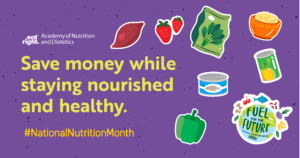March is National Nutrition Month!
There is a lot of nutrition information out there and it can become extremely overwhelming. If you are new to the topic of nutrition and you are just now starting your journey to improving your nutrition, here are two simple concepts to focus on:
Energy balance
When it comes to food/beverage intake, eating more calories than your body needs will likely result in weight gain where as eating too little will result in weight loss. Weight gain isn’t always a bad thing, especially if you are trying to put on muscle mass. Weight loss isn’t always a good thing, especially if you are aren’t trying to lose weight or if you are losing weight rather quickly.
Start with getting an idea of how many calories you need. Take into account how consistently active you are. There are some calculations that can be done to figure this out, but remember that these aren’t always perfect. That’s why it’s important to become in tune with your body and understand what it might be telling you. Working with a coach or a dietitian can be helpful for getting a sense of direction, accountability and overall education.
Food Quality
A diet with a variety of fruits, vegetables, legumes, fish and meat can be really impactful. The nutrients that these foods provide can help keep you feeling full and your body doing all that it needs to do to keep you going. Carbohydrates have long been demonized but they bring incredible benefits. They are your body’s preferred source of energy and they also include things like fiber. Fiber has been tied to quite a few health benefits like heart health, weight management, and appetite management. It can also support the bacteria that live in our gut [1,2].
This isn’t to say that you can never enjoy foods with a less robust nutritional profile. You absolutely can! Nutritious foods are meant to be the foundation of your regular intake and the other foods can be enjoyed periodically. As long as you are mindful and aware of the calories that you need – you can figure out your strategy.
The topic of food quality has become pretty polarizing. You may here many things pertaining to specific food groups, non-organic foods, “processed foods” and sugar. Don’t let this scare you. What is really comes down to is examining the resources available to you and creating a plan from there. Nutrition is very individualized. If a specific food does not sit well with you and it makes you feel sick – avoid it. But know that just because it can have a negative impact on someone else, does not mean that it will have the same impact on you!
You can find nutritious food in a can, dried foods in a bag or from the frozen section. These foods are just as good, they are cost effective and can decrease instances of food waste. If you can’t buy organic – it’s okay. What matter’s most is that you are getting the nutrients from somewhere – even if it isn’t organic.

Helpful tip: To help save money and reduce food waste, plan your meals and snacks and make a grocery list before heading to the store! More tips for shopping on a budget: sm.eatright.org/shopbudget
It doesn’t have to be complicated.
In short, a great place to start would be [depending on where you want to be] to eat enough, not too much and create a foundation of nutritious food choices with some room for the fun stuff.
If you are still unsure where to start or you’d like some guidance, we do offer coaching and would love to help!
Thanks for reading,
Crystal McLean, MS
Head Coach, DiamondFit Nutrition
*Not medical advice. Please consult with your physician or provider before making any changes to your diet. Especially if you have a medical condition or you are on medication that can interact with specific foods/nutrients.*
Sources:

